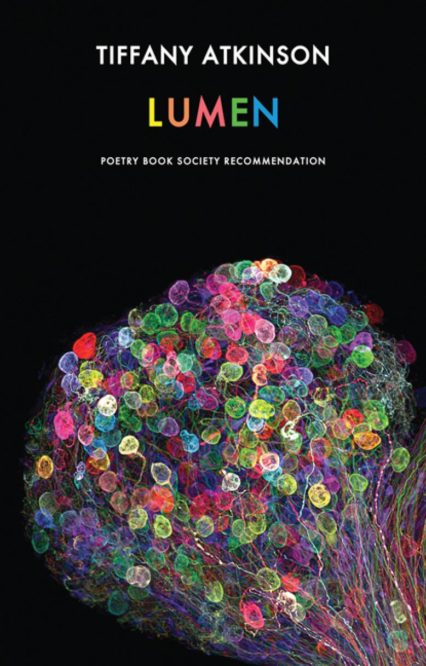Nathan Munday reviews Poetry Book Society recommendation Lumen by Tiffany Atkinson, a collection which explores themes of pain, illness and love through a dry sense of humour.
How much more can we bear? Where exactly is it hurting? These questions can seem impossible to answer and are often awkward and uncomfortable. During university, I remember rushing into hospital after an unusual incident involving a pull-up bar, a missing screw and my face. A doctor asked me, “on the scale of 1-10, how much pain are you in?” I can’t remember my response…

Perhaps poignant is the best adjective to describe Tiffany Atkinson’s prize-winning sequence ‘Dolorimeter’ which begins her fourth collection of poetry entitled Lumen. Poignant is an old word; I think it stepped over the threshold of our tongue in the fourteenth century. Granted: not a very nice time to be alive seeing that the bubonic plague had also crossed the channel around 1348. If we look at its etymology, we unearth words like sharp, moving, pointed, touching, biting, stinging, harsh – all attempting to capture and explain. Pain, a similar word, has been lurking around a bit longer; the Welsh and the Cornish had already borrowed their poen and ponow from the Latin, long before the English arrived.
But I digress.
‘A dolorimeter’, we are told from the outset, ‘is an instrument / used to measure pain / threshold and tolerance.’ The first poem concludes that ‘Dolorimetry’ ‘might also’ be called ‘language’.
The first sequence of Lumen, the heart of the collection, became a Via Dolorosa for me (I use that phrase cautiously and respectfully): a difficult, processional route. Some streets were surprising; the reader is privy to hilarious moments captured from the wards. Other paths are ladened with harsh, almost stoic frankness. Atkinson’s masterful use of these fragments places her in a bardic tradition where memorialising (anfarwoli in Welsh, literally meaning to ‘un-die someone’) is a linguistic act, a duty even, not confined to celebrating the dead. No, the poet celebrates life even when it is broken or at its most vulnerable. Aneirin went to the battlefield; Atkinson goes to the hospital.
During her residency, the poet explores this notion that pain resists language and vice versa. In ‘A line from the doctor (annotated)’, the speaker states that:
We are trying to avoid the word pain
It is far too full of itself
What follows is an etymological trek veering closely to the theological concepts of judgment and hell; the speaker states that ‘these are no longer medical concerns’, finishing the poem with a powerful couplet:
Keep the language clean and well-lit
Leave its shadows swinging on the gate
I’ll allow you to interpret those multivalent lines for yourselves. For me, this so-called ‘clean’ language may be alluding to a clinical, ‘Western’ society where words, for various reasons, are forbidden from reaching their full, multivalent potential. We’re trying to avoid a lot of things, aren’t we? But perhaps this current pandemic resists that tendency. Pain and death have crossed over our own thresholds. Lunchtime news after lunchtime news with those sobering statistics. Lockdowns. Family losses. It differs in every household. Every village has its own story and how we talk and write about it can never just be ‘clean’ and without shadow.
In poems like ‘A Biblical pain & and aside on bedside manner’, we’re told of a ‘dumbness’ of ‘seven days and seven nights’ between Job and his comforters where ‘no one said a word’. These gaps have a quasi-healing function; the story presents an age-old theme where silence precedes resurrection. In ‘Clean Windows’, the speaker glimpses a white van climbing out of a valley towards ‘the new world’. For me, this was a rainbow moment, promising freedom and rebirth.
‘The Smokers outside Bronglais Hospital’ finishes the sequence on a high, bringing Zeno’s paradoxes to the ‘smouldering threshold’ of the hospital:
The smokers meanwhile
are proving how all things in motion
have first to show up
at the half-way mark ergo
and by minute degrees
as Zeno might have mentioned
had he stopped for a light
outside Bronglais the cigarette is in principle un-
finishable So the burnt herb travels for ever
the space between body and ghost
The same distance for all of us
and oh a finger’s length at most
Gaps and silences are the ‘hinge[s] on which the whole tale turns.’ The cigarette becomes an unlikely endoscope – that pulsating light exploring ‘the quandary of how to formulate what’s / inside’ us, expressed so vividly in the poem ‘Last’. And it’s that pulsating light – perhaps a metaphor for poetry itself – that continues into the second part of the book, seeking to articulate the body in all its idiosyncrasies. It flickers, dimming and illuminating, never fully lit and never fully snuffed out.
There’s so much more to comment on in Lumen, and I haven’t even mentioned Otto the ‘red dog’!
I’ll conclude by saying that a good poet makes you laugh, wonder, and even cringe at times; they unsettle you. It’s not always easy reading. I think it was Søren Kierkegaard that said that anxiety is necessary for creativity; it ‘can just as well express itself by muteness as by a scream’. Atkinson’s Lumen gives us a glimpse into language’s dizzying heights… sit there awhile… acknowledge those limits, but celebrate its full potential.
Lumen by Tiffany Atkinson is available now from Bloodaxe Books.
Nathan Munday is a regular Wales Arts Review contributor.
Recommended for you: Wales Arts Review’s Flash Fiction collection featuring original works from Cynan Jones, Nigel Jarrett, Richard Gwyn and many more of Wales’ best literary talents.











